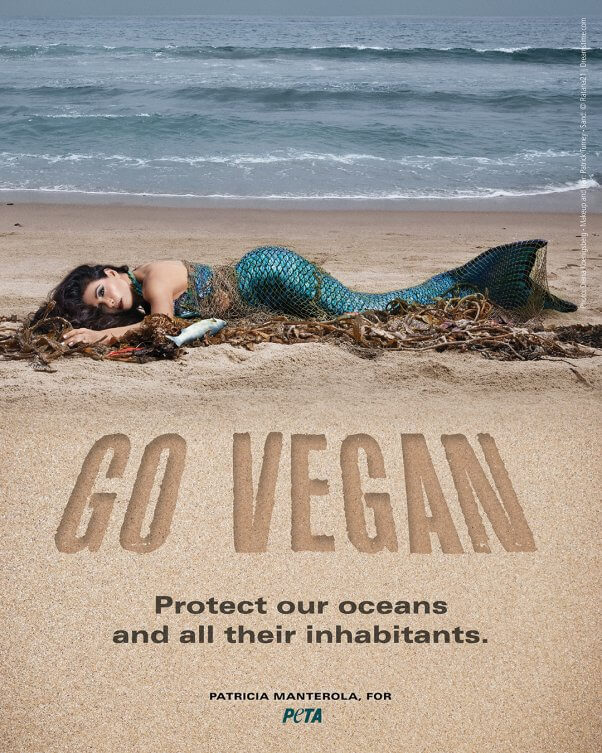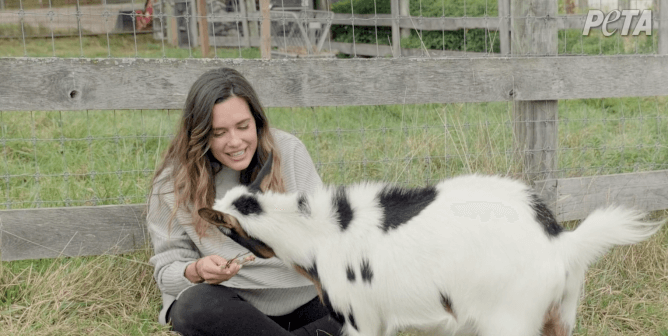Patricia Manterola and PETA Latino Are Making Waves to End Fishing
Mexican music, film, and television star Patricia Manterola is beautiful as a mermaid, but if mermaids were real, they’d probably suffer like fish, dolphins, manatees, and others do at the hands of the fishing industry. Patricia has joined PETA Latino to share a very important message about the ocean and its inhabitants.

Fishing is cruelty on a colossal scale, killing hundreds of billions of aquatic animals worldwide every year—far more animals than any other industry. Some are destined for human consumption, many are tortured for “sport,” and others are unintended victims who are maimed or killed simply because they’re in the wrong place at the wrong time.
Fish feel pain in a way similar to humans, have complex communication methods, and can experience fear. Dr. Sylvia Earle—one of the world’s top marine biologists—has said, “You know, fish are sensitive, they have personalities, [and] they hurt when they’re wounded.” So when fishing nets rip animals from their homes, pack them so tightly together that they’re crushed by the weight of thousands of other victims, drag their sensitive scales along the ocean floor, and force them to undergo decompression—which often ruptures their swim bladders and pushes their stomachs out of their mouths and their eyes out of their sockets—fish no doubt endure an excruciating, terrifying journey to the surface. Then, if they’re still alive, fishers often cut their gills and leave them to bleed out or toss them onto ice to freeze or slowly suffocate. You wouldn’t want to be kicked, thrown, suffocated, or hacked to death on a chopping block—and neither do they.
And as it turns out, fish aren’t the only ones suffering at the hands of this cruel industry. Scientists estimate that more than 650,000 marine mammals—dolphins, whales, and porpoises—are seriously injured or killed every year by the commercial fishing industry. Becoming entangled in fishing gear is the single biggest threat to the survival of many of the world’s 86 cetacean species, and eating sea life contributes to the decimation of ocean ecosystems.
Sea turtles, birds, seals, whales, sharks, and other fish who “accidentally” get tangled in nets and hooked by longlines are considered “bycatch”—a euphemism for “non-target” animals who are caught or become entangled in fishing nets or other gear and are then simply discarded and left to die, if they haven’t died already.
Not only has the fishing industry destroyed entire ocean ecosystems and the animals who live there, it also harms our health. Fish flesh stores dangerous contaminants, including PCBs, which can cause liver damage, nervous system disorders, and fetal damage; dioxins, which have been linked to cancer; and radioactive substances, such as strontium-90. “Seafood” is one of the most common causes of food poisoning in the U.S., and almost 7 million Americans are believed to be allergic to it.
Join Patricia Manterola and Do Your Part to Help Ocean Animals
An estimated 90% of the ocean has been fully exploited, and at this rate, there really won’t always be plenty more fish in the sea. However, our choices could turn the tide. By leaving fish and other aquatic animals off our plates, we can spare the lives of countless animals and take a stand against an environmentally destructive global industry that harms millions of sentient beings every day.
Join Patricia Manterola and help end the demand for fish flesh—order a free vegan starter kit from PETA today!




